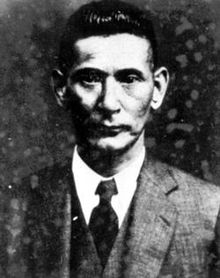- Shūmei Ōkawa
-
Shūmei Ōkawa 
Shūmei ŌkawaBorn December 6, 1886
Sakata, Yamagata, JapanDied December 24, 1957 (aged 71)
Tokyo, JapanNationality Japanese Occupation Educator, Political philosopher, Islamic scholar, historian In this Japanese name, the family name is "Ōkawa".Shūmei Ōkawa (大川 周明 Ōkawa Shūmei, December 6, 1886 – December 24, 1957) was a Japanese nationalist, Pan-Asian writer and Islamic scholar.
Contents
Background
Ōkawa was born in Sakata, Yamagata, Japan in 1886. He graduated from Tokyo Imperial University in 1911, where he had studied Vedic literature and classical Indian philosophy. After graduation, Ōkawa worked for the Imperial Japanese Army General Staff doing translation work. He had a sound knowledge of German, French, English, Sanskrit and Pali.[1]
In the summer of 1913 he read a copy of Sir Henry Cotton's New India or Indian in transition (1886 revised 1905) which dealt with the contemporary political situation. After reading this book, Ōkawa abandoned "complete cosmopolitanism" (sekaijin) for Pan-Asianism. Later that year articles by Anagarika Dharmapala and Maulavi Barkatullah appeared in the magazine Michi, published by Dokai, a religious organization in which Ōkawa was later to play a prominent part.
After years of study of foreign philosophies, he became increasingly convinced that the solution to Japan's pressing social and political problems lay in a revival of traditional Japanese philosophy and a renewed emphasis on the kokutai principles.[2]
In 1918, Ōkawa went to work for the South Manchurian Railway Company, under its East Asian Research Bureau. Together with Ikki Kita he founded the nationalist discussion group and political club Yuzonsha. In the 1920s, he became an instructor of history and colonial policy at Takushoku University, where he was also active in the creation of right-wing and anti-capitalist student groups.[3]
In 1926, Ōkawa published his most influential work: "Japan and the Way of the Japanese" (Nihon oyobi Nihonjin no michi), which was so popular that it was reprinted 46 times by the end of World War II. Ōkawa also became involved in a number of attempted coups d'état by the Japanese military in the early 1930s, including the March Incident, for which he was sentenced to five years in prison in 1935.[4] Released after only two years, he briefly re-joined the South Manchurian Railway Company before accepting a post as a professor at Hosei University in 1939. He continued to publish numerous books and articles, helping popularize the idea that a "clash of civilizations" between the East and West was inevitable, and that Japan was destined to assume the mantle of liberator and protector of Asia against the United States and other Western nations.[5]
Tokyo War Crimes Tribunal
 Okawa in court
Okawa in court
After World War II, Ōkawa was prosecuted as a class-A war criminal by the Allies. However, he started behaving erratically – hitting the bald head of the former prime minister Hideki Tōjō, shouting "Inder! Kommen Sie!" (Come, Indian!) in German, and so on. Therefore, the presiding judge Sir William Webb (The President of the Tokyo Tribunal) concluded that he was mentally ill and dropped the case against him.[6] From the beginning of the tribunal, Ōkawa was saying that the court was a farce and not even worthy of being called a legal court.[citation needed] Therefore, some people still believe that he was feigning madness.[citation needed]
Translation of Quran
Ōkawa was transferred from the jail to a US Army hospital in Japan, which concluded that he had mental instability. Later, he was transferred to the Tokyo Metropolitan Matsuzawa Hospital, a famous mental hospital, where he completed the first Japanese translation of the entire Quran.[7] He was released from hospital in 1948. He died in Tokyo in 1957.
Major publications
- Some issues in re-emerging Asia (復興亜細亜の諸問題), 1922
- A study of the Japanese spirit (日本精神研究), 1924
- A study of chartered colonisation companies (特許植民会社制度研究), 1927
- National History (国史読本), 1931
- 2600 years of the Japanese history (日本二千六百年史), 1939
- History of Anglo-American Aggression in East Asia (米英東亜侵略史), 1941
☆☆Best seller in Japan during the WW2☆☆
- Introduction to Islam (回教概論), 1942
- Quran (Japanese translation), 1950
Notes
- ^ Wakabayashi, Modern Japanese Thought, pp.226
- ^ Samuels, Securing Japan: Tokyo's Grand Strategy and the Future of East Asia, pp. 18
- ^ Calvocoressi, The Penguin History of the Second World War pp.657
- ^ Jansen, The Making of Modern Japan, pp.572
- ^ Wakabayashi, Modern Japanese Thought, pp.226-227
- ^ Maga, Judgment at Tokyo: The Japanese War Crimes Trials
- ^ This was not from Arabic, as Ōkawa could not read that language. He made his translation from about 10 language editions, including English, Chinese, German, and French. The most popular translation appeared in the late 1950s; it is by T. Izutsu, who was helped by Ōkawa. Ōkawa's version is difficult to find nowadays.
References
- Calvocoressi, Peter (2001). The Penguin History of the Second World War. Penguin Non-Classics. ISBN 0140285024.
- Jansen, Marius B. (2000). The Making of Modern Japan. Belknap Press. ISBN 0674009916.
- Maga, Timothy P. (2001). Judgment at Tokyo: The Japanese War Crimes Trials. University Press of Kentucky. ISBN 0-8131-2177-9.
- Samuels, Richard J (2007). Securing Japan: Tokyo's Grand Strategy and the Future of East Asia. Cornell University Press. ISBN 0801446120.
- Wakabayashi, Bob (2007). Modern Japanese Thought. Cornell University Press. ISBN 0801446120.
Esternal links
- Takeuchi Yoshimi: "Profile of Asian Minded Man x: Okawa Shumei"
- Prof Dr. Selçuk Esenbel, Dozentin an der Bosporus-Universität: "Japan's Global Claim to Asia and the World of Islam: Transnational Nationalism and World Power, 1900–1945"
- Ōkawa hitting Dojo
Categories:- 1886 births
- 1957 deaths
- People from Yamagata Prefecture
- University of Tokyo alumni
- Historians of Japan
- Japanese translators
- Japanese writers
- Japanese non-fiction writers
- Islamic studies scholars
- Quran translators
Wikimedia Foundation. 2010.

